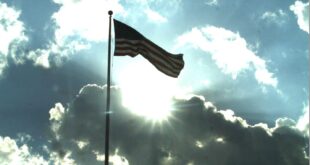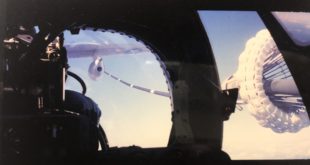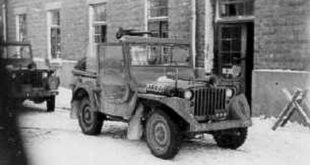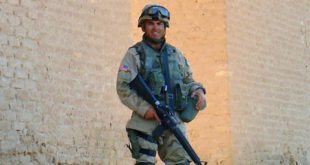by Susan Katz Keating
Jack Carr and James M. Scott have produced a master class in how to write contemporary history.
Morning reveille had not yet sounded on Oct 23, 1983, when a terrorist drove a bomb-laden truck into the headquarters and barracks building of the U.S. Marine Corps peacekeeping force in Beirut, Lebanon. The massive blast lifted the building off its foundation, and reduced it to rubble, killing 241 American servicemen. Much has been written about that horrific day, but now two top class authors – bestselling novelist Jack Carr and Pulitzer Prize finalist James M. Scott – have written the comprehensive account of that untold origin story of the war on terror.
Together they have produced a master class in how to write contemporary history. They spoke with me recently about the book and how they wrote it. We had such a great chat, I wish I had done it as a podcast episode. Here are highlights of our conversation.
Susan Katz Keating: This book is so well documented, and it’s so meticulous. You drew from documents, archives, interviews with survivors and family members, after action reports, so much more. Can you tell me about the legwork and the time that went into putting this together?

Jack Carr. Photo by Mike Stoner Photography
Jack Carr: I will tell you that that is 100% the result of James Scott. There was only one person I wanted to partner on this project with, and that was him. I always wanted to branch out into nonfiction at some point. We have a lot of history in the novels as it is. So about three years ago, I went to my publisher with a proposal to branch out into the nonfiction space and start a series that focuses on different terrorist events, ones that had an impact on our foreign policy. A series with the intent of capturing the strategic, operational and tactical levels, and also humanizing those events. I told them I wanted to partner with someone who really knows what they’re doing. On the research front, I didn’t want this to be pop history, meaning me reading a lot of books on terrorism and then regurgitating them and providing a little analysis, or something along those lines. I wanted this to be a serious work of history. And I loved this guy, James Scott, who had these five books.

James M. Scott. Photo by Stephanie Selby
James M. Scott: This is all Jack’s idea. His concept, his vision for it. And as events have shown us, this event is the beginning. This is the origin story of so much of the Iranian backed proxies that have been such a menace to peace for so long. We really wanted to do real reporting and dig into these topics and talk to the survivors, talk to the family members. You go into the archives, find the records that have been declassified, what’s new, and things like that, and really be able to take it and run with it. It’s a historical scavenger hunt. You’re trying to find the documents and the sources to sort of put together this big puzzle. And in this case, we were so blessed because when we reached out to the veterans, they were thirsty for somebody to tell their story, and so we had phenomenal cooperation.
SKK: As a journalist, I’ve written about trauma, and I see that here, you talked to survivors, and you talked to family members and you talked to people who were involved. That’s a heavy trauma load. How did you keep your equilibrium while you were going through this?
Jack Carr: It’s emotional. And when I write the thrillers, every now and again in a chapter, I’ll get emotional, and that’s a good thing when I’m writing it, when I’m rereading it, when I’m editing it. When I go through it again, I get emotional in certain parts, and I think, oh, great. Okay, that’s wonderful. I’m getting emotional. That’s a good thing. There’s heart and soul and feeling and emotion in this.
And of course, talking to these guys about Beirut, you see that a lot of them are still living in October of 1983, and some have moved on. But you bring them back there, and you talk to them, and it’s hard just to listen and then to regurgitate some of these stories or try to express some of these stories on a podcast or something else. I’m emotional in every single interview that I do. It’s emotional just to think about these guys who were trapped in the rubble, pulled from the rubble after five hours, or spent time digging through that rubble, or administering last rights, or identifying bodies, or whatever it might be. And the families with that empty chair at the dinner table still today, it’s emotional. So I can only imagine what these guys go through every day when they think back on October 1983.
James M. Scott: We’re approaching these people, and we’re asking about the worst day of their life. You know, the day that your husband died, or your father was killed, or that you were buried in the rubble. For somebody like Chaplain Danny Wheeler, who’s the last survivor pulled out, in some of these guys, it’s, they don’t want to talk, or they’re reluctant. My father had gone through something similar. He was on the USS Liberty, which was a spy ship that ended up being attacked by the Israelis, and 34 Americans were killed [while writing a book on that incident, Scott saw the toll his interviews took on his father and shipmates]. That was a really powerful lesson. It’s made me more appreciative when I’m talking to people who’ve seen a lot of the worst of it.
For so many people, Beirut 1983 was just part of the news cycle. But for these guys, it becomes the defining moment of their lives. It’s something that they think about when they wake up in the morning, something that they remember when they go to bed at night. And it will be that way forever. And so having that consciousness and that awareness, I think, helps. It’s been a privilege, and it’s been an honor to share their stories.

peacekeeping force, in reference to the order that they will not use their
weapons unless it is necessary to protect themselves and their fellow Marines.
Photo: National Archives.
SKK: Did you find that you had to do any kind of emotional self protection on yourself when you were writing about this?
Jack Carr: It’s kind of like normal. It doesn’t mean I’m inoculated to it at all. It just means that it’s not a shock with these things or to read these stories. I think I just had an awareness, really, through my time in the military, writing and reading, and studying. I’ve been a student of warfare my entire life. It was just a part of human history. I didn’t do anything that would not be a part of my just normal everyday life and studying warfare and trying to keep up with what’s going on, writing the thrillers and everything else. So it’s really just an awareness more than anything else.
James M. Scott: It’s heavy material, like Jack said, and there’s no doubt it weighs on you. I don’t ever seem to take on light hearted projects. Every one of these stories affects you. I mean, I can’t tell you how many times I told Chaplain Wheeler, when we were interviewing him again for the podcast, I get chills. I get emotional listening to that story. What he went through underground for those five hours, when he was buried, in the way he argued with God and he questioned his faith and he feared for his family and his children. It just kills me every time I hear that story. I think Chaplain Wheeler’s story is the most emotional and powerful story I’ve ever heard.
SKK: So what’s next? What’s your next book in the series?
Jack Carr: It’s classified right now. But this is a series of books to look into these different events and capture these lessons in the hope that people will read them.
SKK: Any final thoughts?
James M. Scott: We want to thank the families and the Beirut survivors. They were so awesome to work with and so willing to share their stories with us that it’s just been a privilege and honor for us to be able to tell those stories.
“Targeted: The 1983 Beirut Barracks Bombing,” is published on Sept. 24, 2024, by Atria Books/Emily Bestler Books, a division of Simon & Schuster.
 Soldier of Fortune Magazine The Journal of Professional Adventurers
Soldier of Fortune Magazine The Journal of Professional Adventurers






